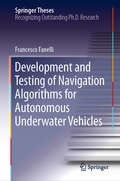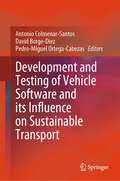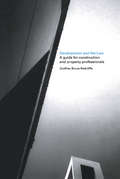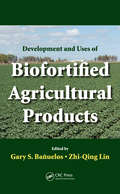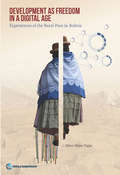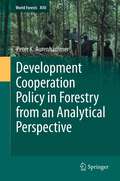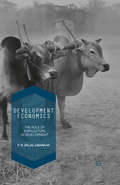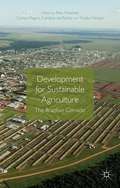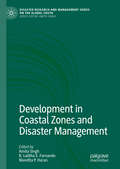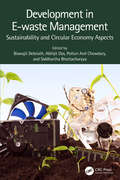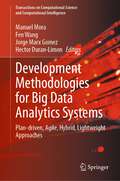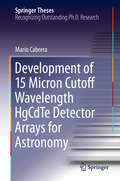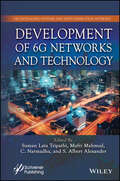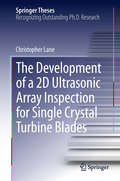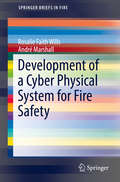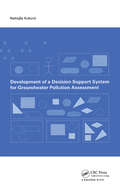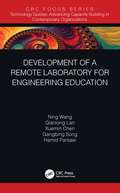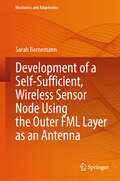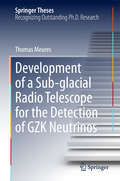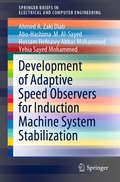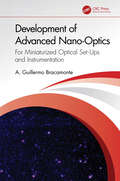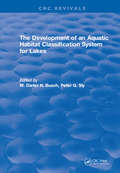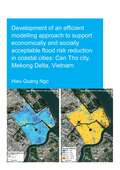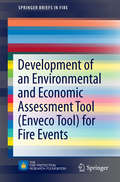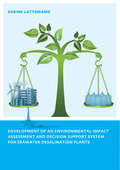- Table View
- List View
Development and Testing of Navigation Algorithms for Autonomous Underwater Vehicles (Springer Theses)
by Francesco FanelliThis book focuses on pose estimation algorithms for Autonomous Underwater Vehicles (AUVs). After introducing readers to the state of the art, it describes a joint endeavor involving attitude and position estimation, and details the development of a nonlinear attitude observer that employs inertial and magnetic field data and is suitable for underwater use. In turn, it shows how the estimated attitude constitutes an essential type of input for UKF-based position estimators that combine position, depth, and velocity measurements. The book discusses the possibility of including real-time estimates of sea currents in the developed estimators, and highlights simulations that combine real-world navigation data and experimental test campaigns to evaluate the performance of the resulting solutions. In addition to proposing novel algorithms for estimating the attitudes and positions of AUVs using low-cost sensors and taking into account magnetic disturbances and ocean currents, the book provides readers with extensive information and a source of inspiration for the further development and testing of navigation algorithms for AUVs.
Development and Testing of Vehicle Software and its Influence on Sustainable Transport
by Antonio Colmenar-Santos David Borge-Diez Pedro-Miguel Ortega-CabezasThis book evaluates the contributions of the electronic control unit software of an electric vehicle on sustainability and society, such as the reduction of emissions during a product design and the improvements in the vehicle. A sustainable transport model is proposed, demonstrating its economic viability. By validating software in a more efficient way and adding new functionalities to the software to enhance driving efficiency, energy consumption can be significantly reduced. Therefore, software validation and development have a significant impact on sustainability. This book offers innovative validation solutions based on artificial intelligence techniques to reduce validation time and emissions. The impact of driving efficiency on sustainable transport models is studied in detail, making proposals to be considered in the current environmental policies under discussion within the European Union in order to improve the sustainability of transport models. Vehicles are becoming sophisticated electronic systems due to the fact that they are integrating a significant number of electronic control units. This trend will certainly continue in the year to come. Consequently, software validation techniques are a key element for car manufacturers in order to ensure the quality of the vehicle. This book contributes to these efforts.
Development and the Law: A Guide for Construction and Property Professionals
by Godfrey Bruce-RadcliffeA gap has long existed between construction professionals – such as architects, engineers, quantity surveyors and consultants – and the property development process. The underlying development structures, expressed in terms of legal obligation and accountability, are all too little understood. This practical guide by a highly experienced lawyer identifies the role of the construction professional in a wider context and looks beyond their relationship with their immediate employer. It provides the development professional with an understanding of the many relationships involved in projects, both in terms of contractual obligation and duty of care. This encourages more effective communication between those involved, including joint venture partners, bankers, funders, landowners with an interest in the outcome and tenants.
Development and Uses of Biofortified Agricultural Products
by Gary S. Bañuelos Zhi-Qing LinAlthough ending world hunger remains the most important goal, increasingly the focus is on simultaneously improving world malnutrition. Paradoxically, nutritionally important trace elements essential for human health are both deficient and over-abundant in soils in many regions of the world. Using a multidisciplinary approach, Development and Uses
Development as Freedom in a Digital Age
by Bjã¶rn Sã¶ren GiglerUnder what conditions can new technologies enhance the well-being of poor communities? The study designs an alternative evaluation framework (AEF) that applies Amartya Sen's capability approach to the study of information and communications technologies (ICTs) in order to place people's well-being, rather than technology, at the center of the study. The AEF develops an impact chain that examines the mechanisms by which access to, and meaningful use of, ICTs can enhance people's "informational capabilities ? and improve people's human and social capabilities. This approach thus uses people's individual and collective capabilities, rather than measures of access or use, as its principal evaluative space. Based on empirical evidence from indigenous communities' use of new technologies in rural Bolivia, the study concludes that enhancing poor people's informational capabilities is the most critical factor determining the impact of ICTs on their well-being. Improved informational capabilities, like literacy, do enhance the human capabilities of poor and marginalized peoples to make strategic life choices and achieve the lifestyle they value. Evaluating the impact of ICTs in terms of capabilities thus reveals no direct relationship between improved access to, and use of, ICTs and enhanced well-being; ICTs lead to improvements in people's lives only when informational capabilities are transformed into expanded human and social capabilities in the economic, political, social, organizational, and cultural dimensions of their lives. The study concludes that intermediaries are bound to play a central, even fundamental, role in this process. They help poor communities to enact and appropriate ICTs to their local socio-cultural context so that their use becomes meaningful for people's daily lives, enhances their informational capabilities, and ultimately improves their human and social capabilities.
Development Cooperation Policy in Forestry from an Analytical Perspective
by Peter AurenhammerAny reader eager to gain a comprehensive insight into forest development policy, praxis and reality shouldn't miss this excellent publication. Hard to find a comparable reading where the author is digging as deep into Forest Development Policy. The author discovered numerous highly relevant theories as well as inspiring cases about forests and people from around the world, focusing on 'change' rather than 'development' and on the role of various actors in creating or preventing 'change'. The exciting results uncover reality and lead to inspiring discussions on concepts of development cooperation. All individual theoretical arguments and empirical proofs are well based and shed light into the political process of Forest Development Policy. The book is an essential contribution to scholarly debate and research on forestry in the South, and its relations to development cooperation, for both, readers with theoretical and practice related interests.
Development Economics: The Role of Agriculture in Development
by P. N. JunankarThe papers in this book study economic development from the perspective of social justice and economic efficiency; exploring the role of land tenure and productivity in Indian agriculture. Junankar discusses the efficiency of small farms versus large farms, and the role of share-cropping tenancy.
Development for Sustainable Agriculture: The Brazilian Cerrado
by Yutaka Hongo Carlos Magno Campos da Rocha Akio HosonoSince the mid-1970s, the tropical savanna, known as Cerrado, has been transformed into one of the world's largest grain-growing regions. This book explores how and by what Brazil achieved inclusive and sustainable growth in the Cerrado.
Development in Coastal Zones and Disaster Management (Disaster Research and Management Series on the Global South)
by Amita Singh R. Lalitha. S. Fernando Nivedita P. HaranIn the last two decades, coastal regions have relatively endured some of the fiercest oceanic and geophysical disasters than the earlier decades. Yet, disaster management governance fails to match the human, nonhuman and environmental calamity which is unfolding in its most frequent and unpredictable pattern. Between the Asian Tsunami of 2004 to the devastating Chennai and Kerala floods of 2018 the socio-industrial-livelihood impact alerts governments towards a greater and more serious compliance to laws for coastal conservation. The United Nations Office for Disaster Risk Reduction (UNDRR) in 2018 had shocking statistics to share as the deaths and damages related to only Tsunami disaster at the coasts to 251,770 and US$280 billions respectively in the last 20 years (1998-2017) as compared to 998 and US$ 2.7 billion in the previous 20 years (1978-1997). Coastal conservation is no more a question of casual governance but has become a need for survival. The region of South Asia which ranks much higher in its vulnerability, weak resilience and relatively undersupplied governance structures ought to take this responsibility on a priority. The spirit of Hyogu Declaration and the Sendai Framework for Action suggests preparedness and resilience building as key approach areas in coastal governance. The book is incomparable in its holistic and transdisciplinary social science based approach to disaster management which links conservation of marine flora and fauna, ecosystems and land management with decision making processes and coastal regulations. These grass root findings from the subcontinent are substantiated by a section on the most powerful court battle on the Kerala Floods as a guideline for readers to discerningly identify an ‘Act of God’ often used as a veil to hide lack of preparedness, apathy and political greed. This book becomes indispensable reading for anyone involved in research, administration or any level of decision making for the mitigation and prevention of disasters.
Development in E-waste Management: Sustainability and Circular Economy Aspects
by Biswajit Debnath Abhijit Das Potluri Anil Chowdary Siddhartha BhattacharyyaThis book concerns the developments in the field of e-waste management with a particular focus on urban mining, sustainability, and circular economy aspects. It explains e-waste recycling technologies, supply chain aspects, and e-waste disposal in IT industries, including health and environmental effects of e-waste recycling processes, and associated issues, challenges, and solutions. Further, it describes the economic potential of resource recovery from e-waste. Features: Covers recent developments in e-waste management Explores technological advances, such as nanotech from e-waste, MREW, fungal biotech, and so forth Reviews electronic component recycling aspects Discusses the implementation of circular economy in the e-waste sector Includes urban mining and sustainability aspects of e-waste This book is aimed at graduate students and researchers in environmental engineering, waste management, urban mining, circular economy, waste processing, electronics, and telecommunication engineering, electrical and electronics engineering, and chemical engineering.
Development Methodologies for Big Data Analytics Systems: Plan-driven, Agile, Hybrid, Lightweight Approaches (Transactions on Computational Science and Computational Intelligence)
by Manuel Mora Fen Wang Jorge Marx Gomez Hector Duran-LimonThis book presents research in big data analytics (BDA) for business of all sizes. The authors analyze problems presented in the application of BDA in some businesses through the study of development methodologies based on the three approaches – 1) plan-driven, 2) agile and 3) hybrid lightweight. The authors first describe BDA systems and how they emerged with the convergence of Statistics, Computer Science, and Business Intelligent Analytics with the practical aim to provide concepts, models, methods and tools required for exploiting the wide variety, volume, and velocity of available business internal and external data - i.e. Big Data – and provide decision-making value to decision-makers. The book presents high-quality conceptual and empirical research-oriented chapters on plan-driven, agile, and hybrid lightweight development methodologies and relevant supporting topics for BDA systems suitable to be used for large-, medium-, and small-sized business organizations.
Development of 15 Micron Cutoff Wavelength HgCdTe Detector Arrays for Astronomy (Springer Theses)
by Mario CabreraThis thesis describes advances in the understanding of HgCdTe detectors. While long wave (15 μm) infrared detectors HgCdTe detectors have been developed for military use under high background irradiance, these arrays had not previously been developed for astronomical use where the background irradiance is a billion times smaller. The main pitfall in developing such arrays for astronomy is the pixel dark current which plagues long wave HgCdTe. The author details work on the success of shorter wavelength development at Teledyne Imaging Sensors, carefully modeling the dark current–reverse bias voltage curves of their 10 μm devices at a temperature of 30K, as well as the dark current–temperature curves at several reverse biases, including 250 mV. By projecting first to 13 and then 15 μm HgCdTe growth, values of fundamental properties of the material that would minimize tunneling dark currents were determined through careful modeling of the dark current-reverse bias voltage curves, as well as the dark current-temperature curves. This analysis was borne out in the 13 μm parts produced by Teledyne, and then further honed to produce the necessary parameters for the 15 μm growth. The resulting 13 μm arrays are being considered by a number of ground-based astronomy research groups.
Development of 6G Networks and Technology (Next Generation Computing and Communication Engineering)
by Suman Lata Tripathi Mufti Mahmud C. Narmadha S. Albert AlexanderThis book provides an in-depth exploration of the potential impact of 6G networks on various industries, including healthcare, agriculture, transport, and national security, making it an essential resource for researchers, scholars, and students working in the field of wireless networks and high-speed data processing systems. Development of 6G Networks and Technology explores the benefits and challenges of 5G and beyond that play a key role in the development of the next generation of internet. 6G is targeted to improve download speeds, eliminate latency, reduce congestion on mobile networks, and support advancements in technology. 6G has the potential to transform how the human, physical, and digital worlds interact with each other and the capability to support advancements in technology, such as virtual reality (VR), augmented reality (AR), the metaverse, and artificial intelligence (AI). Machine learning and deep learning modules are also an integral part of almost all automated systems where signal processing is performed at different levels. Signal processing in the form text, image, or video needs large data computational operations at the desired data rate and accuracy. Large data requires more use of IC area with embedded bulk memories that lead to power consumption. Trade-offs between power consumption, delay, and IC area are always a concern of designers and researchers. Energy-efficient, high-speed data processing is required in major areas like biomedicine and healthcare, agriculture, transport, climate change, and national security and defense. This book will provide a foundation and initial inputs for researchers, scholars, and students working in the areas of wireless networks and high-speed data processing systems. It also provides techniques, tools, and methodologies to develop next-generation internet and 6G.
The Development of a 2D Ultrasonic Array Inspection for Single Crystal Turbine Blades
by Christopher LaneThis thesis describes the development of a new technique to solve an important industrial inspection requirement for a high-value jet-engine component. The work - and the story told in the thesis - stretches all the way from the fundamentals of wave propagation in anisotropic material and ultrasonic array imaging through to device production and site trials. The book includes a description of a new method to determine crystallographic orientation from 2D ultrasonic array data. Another new method is described that enables volumetric images of an anisotropic material to be generated from 2D ultrasonic array data, based on measured crystallographic orientation. After extensive modeling, a suitable 2D array and deployment fixtures were manufactured and tested on in situ turbine blades in real engines. The final site trial indicated an order of magnitude improvement over the best existing technique in the detectability of a certain type of root cracking. The Development of a 2D Ultrasonic Array Inspection for Single Crystal Turbine Blades should be an inspiration for those starting out on doctoral degrees as it shows the complete development cycle from basic science to industrial usage.
Development of a Cyber Physical System for Fire Safety
by Rosalie Faith Wills André MarshallThis SpringerBrief presents cutting-edge research on an important aspect of smart firefighting which will improve performance, safety, prediction, and resilience. It demonstrates the viability of real-time decision support for smart firefighting and provides validation data for continued cyber-physical system (CPS) development by using a smart networked fire test bed consisting of a multi-story instrumented building, a variety of fire and non-fire networked sensors, and a computational framework anchored by a Building Information Modeling (BIM) representation of the building. The author conducted well-controlled full-scale fire experiments and represents them in the three-dimensional BIM, allowing for visualization of critical static and dynamic building and fire information. The CPS test bed produces clear evidence about the opportunities for fire safety created by the communication between sensors, BIM, and fire. When applied to fire protection, CPS fuses the emerging sensor and computing technologies with building control systems, firefighting equipment, and apparatus. This SpringerBrief reveals some of the key ways CPS makes firefighting safer and more efficient.
Development of a Decision Support System for Groundwater Pollution Assessment
by N. KukuricThis book discusses the development of the decision support system for groundwater pollution assessment, one of the first integrated information systems in the field of hydrogeology, reflecting the purpose of knowledge encapsulation in the field of groundwater quality management.
Development of a Remote Laboratory for Engineering Education (Technology Guides)
by Ning Wang Qianlong Lan Xuemin Chen Gangbing Song Hamid ParsaeiThe field of information technology continues to advance at a brisk pace, including the use of Remote Laboratory (RL) systems in education and research. To address the needs of remote laboratory development for such purposes, the authors present a new state-of-the-art unified framework for RL system development. Included are solutions to commonly encountered RL implementation issues such as third-party plugin, traversing firewalls, cross platform running, and scalability, etc. Additionally, the book introduces a new application architecture of remote lab for mobile-optimized RL application development for Mobile Learning (M-Learning). It also shows how to design and organize the remote experiments at different universities and make available a framework source code. The book is intended to serve as a complete guide for remote lab system design and implementation for an audience comprised of researchers, practitioners and students to enable them to rapidly and flexibly implement RL systems for a range of fields.
Development of a Self-Sufficient, Wireless Sensor Node Using the Outer FML Layer as an Antenna (Mechanics and Adaptronics)
by Sarah BornemannThis book presents an investigation on integrating wireless sensor nodes including their antennas into fiber metal laminates (FMLs) for the purpose of enabling wireless, material-integrated structural health monitoring. Within the scope of this work, a digital sensor node is presented, which can be fully integrated into a conductive host material. A stainless steel antenna supplies the system with sufficient power to provide the functions required for its intended use. This system enables the wireless readout of sensor data for the detection of damage in FMLs. The application focuses on aerospace components, for the detection of damage in the inner material layers, which are not or only hardly detectable by optical inspection methods. Guided ultrasonic waves in the form of Lamb waves are used for this. The flexible electronics are inserted into the layers of the target material, while the associated antenna is cut into the outer metal layer. This turns the outer metal layer, which would prevent wireless communication from inside the laminate, into an advantage, as the need for an additional, external antenna is eliminated. Two fundamentally different principles can be used as the sensor element. Piezoelectric sensors were already used extensively in structural health monitoring using ultrasound and recently developed piezoresistive sensors, which are designed to be very small, making them highly suitable for material integration. Both types of sensors can be read out with the presented system so that the most appropriate approach can be chosen depending on the application. The suitability of the wireless sensor system for its intended purpose is verified by material-integrated measurements. At the end of this work, it is shown that the raw data of the measurements reproducibly provide a sufficient resolution of the sensor signal to manually identify changes caused by applied reversible, artificial pseudo-defects from reference measurements without any damage. The intended audience of this book are people from the field which are familiar with the basic concepts of electrical engineering or similar regions, embedded system enthusiasts and all readers who like to follow the process of a complete wireless electronic system design from requirements analysis to final material-integrated measurement demonstrations.
Development of a Sub-glacial Radio Telescope for the Detection of GZK Neutrinos
by Thomas MeuresThe goal of the project presented in this book is to detect neutrinos created by resonant interactions of ultrahigh energy cosmic rays on the CMB photon field filling the Universe. In this pioneering first analysis, the author puts forward much of the analysis framework, including calibrations of the electronic hardware and antenna geometry, as well as the development of algorithms for event reconstruction and data reduction. While only two of the 37 stations planned for the Askaryan Radio Array were used in this assessment of 10 months of data, the analysis was able to exclude neutrino fluxes above 10 PeV with a limit not far from the best current limit set by the IceCube detector, a result which establishes the radio detection technique as the path forward to achieving the massive volumes needed to detect these ultrahigh energy neutrinos.
Development of Adaptive Speed Observers for Induction Machine System Stabilization (SpringerBriefs in Electrical and Computer Engineering)
by Yehia Sayed Mohammed Ahmed A. Diab Abo-Hashima M. Al-Sayed Hossam Hefnawy Abbas MohammedThis book describes the development of an adaptive state observer using a mathematical model to achieve high performance for sensorless induction motor drives. This involves first deriving an expression for a modified gain rotor flux observer with a parameter adaptive scheme to estimate the motor speed accurately and improve the stability and performance of sensorless vector-controlled induction motor drives. This scheme is then applied to the controls of a photovoltaic-motor water-pumping system, which results in improved dynamic performance under different operating conditions. The book also presents a robust speed controller design for a sensorless vector-controlled induction motor drive system based on H∞ theory, which overcomes the problems of the classical controller.
Development of Advanced Nano-Optics: For Miniaturized Optical Set-Ups and Instrumentation
by A. Guillermo BracamonteThis book discusses advanced nano-optics, from proof of concepts to real applications in devices and miniaturized instrumentation. It covers various themes and topics within nanochemistry and physics that produce enhanced optical and smart responsive materials.Development of Advanced Nano-Optics is about the development of nano-optics with advanced nanochemistry control in order to adjust physical phenomena towards new advanced and enhanced properties and related applications. It explores the development of various physical phenomena, such as the generation of high-frequency electromagnetic fields in the near field show, that have an effect in the far field. The author discusses nano-optoelectronics, light scattering nano-optics, quantum nano-optics, and advances in nanospectroscopy. He also presents proof of concepts from nanochemistry and nano-optics towards advanced applications in nanotechnology and the life sciences. Nano-optical materials in microdevices and miniaturized instrumentation are also presented and discussed.This book is written for a wide range of readers, from undergraduate students to advanced researchers, academics, and practising engineers in industry working in the fields of optics, miniaturized instrumentation, and materials.
The Development of an Aquatic Habitat Classification System for Lakes
by W.D.N. BuschIn the context of freshwater fisheries changing their strategies from the regulation of harvest and the enhancement of populations, to the creation and protection of habitats and the management of ecosystems, moves toward establishing an aquatic habitat classification system. Eight papers, from the February 1988 Symposium on the Classification and Inventory of Great Lakes Aquatic Habitats (the last in a series of Great Lakes Symposia), propose various classification approaches, most using a limited number of physical, chemical, and/or biological variables to produce some form of index. They also include overviews and summaries of the classification process.
Development of an Efficient Modelling Approach to Support Economically and Socially Acceptable Flood Risk Reduction in Coastal Cities: Can Tho City, Mekong Delta, Vietnam (IHE Delft PhD Thesis Series)
by Hieu Quang NgoFlooding is one of the most frequently occurring and damaging natural disasters worldwide. Quantitative flood risk management (FRM) in the modern context demands statistically robust approaches (e.g. probabilistic) due to the need to deal with complex uncertainties. However, probabilistic estimates often involve ensemble 2D model runs resulting in large computational costs.Additionally, modern FRM necessitates the involvement of a broad range of stakeholders via co-design sessions. This makes it necessary for the flood models, at least at a simplified level, to be understood by and accessible to non-specialists. This study was undertaken to develop a flood modelling system that can provide rapid and sufficiently accurate estimates of flood risk within a methodology that is accessible to a wider range of stakeholders for a coastal city – Can Tho city, Mekong Delta, Vietnam. A web-based hydraulic tool, Inform, was developed based on a simplified 1D model for the entire Mekong Delta, flood hazard and damage maps, and estimated flood damages for the urban centre of Can Tho city (Ninh Kieu district), containing the must-have features of a co-design tool (e.g. inbuilt input library, flexible options, easy to use, quick results, user-friendly interface). Inform provides rapid flood risk assessments with quantitative information (e.g. flood levels, flood hazard and damage maps, estimated damages) required for co-designing efforts aimed at flood risk reduction for Ninh Kieu district in the future.
Development of an Environmental and Economic Assessment Tool (Enveco Tool) for Fire Events
by Francine Amon Jonatan Gehandler Selim Stahl Mai Tomida Brian MeachamThis book investigates the feasibility of developing a tool that enables fire departments to estimate the value of their services to a community in terms of environmental and financial impact. This book provides a summary of this effort, which resulted in development of a prototype tool for fire department use. The impact of fire on a community is usually measured in terms of the number of fires, human casualties, and property damage. There are, however, more subtle impacts of fire that are not so easily estimated but contribute to the measure of overall performance of the fire service in protecting a community. While environmental and economic impact assessment methodologies exist as separate systems, they generally require a high level of knowledge that is outside the scope of most fire departments. A relatively simple methodology for estimating the environmental and economic impact of fires helps communities understand the degree to which fire department activities can benefit a community s environmental and economic well-being. The scope and approach for this prototype tool is explained, including risk assessment, cost benefit analysis, life cycle assessment, integration and implementation, and sensitivity and uncertainty analysis. It includes multiple case studies and offers statistical support for future expansion of the tool. Fire service professionals will find this a useful new approach to presenting value in a community, as well as a method for examining their own financial and environmental plans. "
Development of an Environmental Impact Assessment and Decision Support System for Seawater Desalination Plants
by Sabine LattemanSeawater desalination is a coastal-based industry. The growing number of desalination plants worldwide and the increasing size of single facilities emphasises the need for greener desalination technologies and more sustainable desalination projects. A comprehensive evaluation of potential environmental impacts of desalination plants, this book emphasizes discusses strategies for impact mitigation. The author proposes a best-available technology concept for seawater desalination technologies in combination with a methodological approach for the environmental impact assessment (EIA) of desalination projects. It outlines the scope of EIA studies, including environmental monitoring and toxicity and hydrodynamic modeling studies. The book also explores the usefulness of multi-criteria analysis as a decision support tool for EIAs and then uses them to compare different intake and pretreatment options for seawater reverse osmosis plants.
